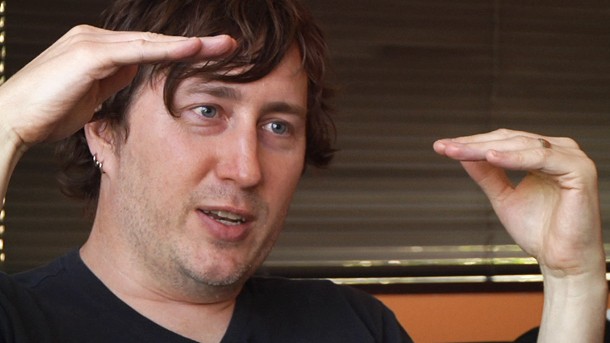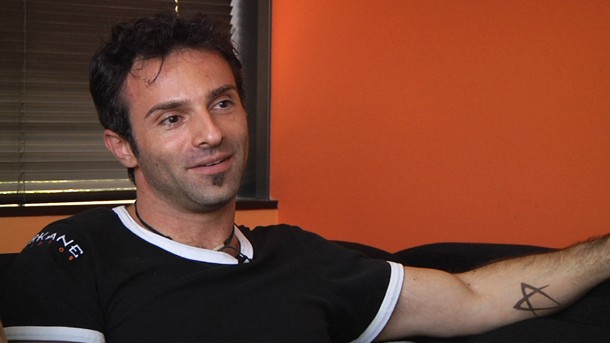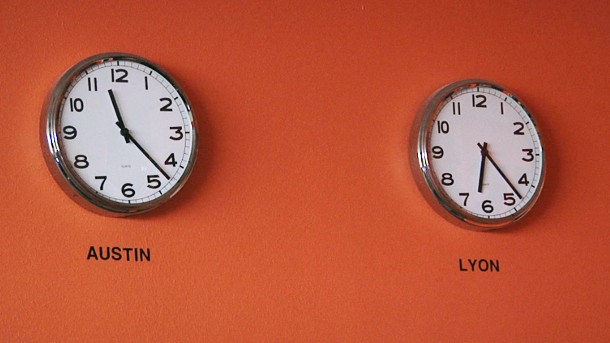Co-Creating Dishonored: An Interview With The Directors

Arkane Studios is betting that two minds are better than one. Harvey Smith and Raf Colantonio have teamed up as equals, serving as co-creative directors for Dishonored. We spoke with the two of them about sharing the workload and what life is like on a daily basis at Arkane Studios.
How did you come to work together?
Raf Colantonio: We met when he was doing Deus Ex and I was doing Arx Fatalis. Both of us had a passion for this type of game, the legacy of Looking Glass, Ultima Underworld, System Shock, that kind of game.
Harvey Smith: Yeah, we both cited Underworld as as our favorite game of all time, the game by Doug Church and Looking Glass. And so Raf came over for a visit and stayed with us [Ion Storm, creators of Deus Ex] for a while in Austin.
Colantonio: Yeah, just for fun, just to see those guys. Because previously I had made a visit to Origin [Origin Systems, creators of Ultima Underworld, System Shock] and I said to Harvey, "I think I met you at Origin."
Smith: I had been the lead tester for System Shock, and he had been testing and promoting System Shock in Europe as well. You know, both of us just drawn to the title by the guys that had made Underworld. Kind of our heroes, really. And when he visited Austin we remembered that I had given him a tour of Austin at one point. Our mutual interest in this type of game, more than an interest really, has drawn us back together over and over, critiquing each other and talking about what we are working on and all that. And so it seems like it was just a matter of time until we wanted to work together.

Harvey Smith, co-creative director for Dishonored.
You bill yourselves as co-creative directors on this project, right? How do you handle that? It is sort of a unique dynamic.
Colantonio: Well I think that both of us used to be very over-direct with what we would express to the team and we would be very opinionated. We've been used to doing that, both of us in our own... kingdoms. When we decided to work together we had to make a few adjustments about making sure that, before we talk to others, we are both in agreement. And most of the time we are both in agreement, like I'd say a good 80-90% of the time.
Smith: Like stating things not so strongly as normal, being a little more respectful. It generally produces better results because it's an area where I'm weak and he steps up creatively or vice versa.
Colantonio: The 10% of the time that we differ we usually come up with something that would probably be better than...
Smith: Individually, yeah. And you know it's funny, people act like sharing a role is an impossible thing -- to be avoided or whatever. And we kind of wondered, "Oh, is this kind of crazy? Is this going to compromise the vision?" But I think it's stronger, and I talked to one of my friends on the Uncharted team and they have not only two creative directors but they also have two lead designers, I believe. So you know, I think it's the right people with the right communication skills and an alignment already.

Raf Colantonio, co-creative director for Dishonored.
So you've talked a lot about your inspirations, but what do you guys feel makes Dishonored unique? What makes it an Arkane game?
Smith: Dishonored is a game where you play this supernatural assassin in this very odd retro-future industrial world and the core stealth combat gameplay is complimented by all these powers that you have, and they layer together really well. It is one of our principal beliefs that you shouldn't protect the player too much from seeing something awkward. Instead, it's better to empower the player to do these things in a general purpose kind of way. Not at the right moment or in a particular scripted encounter, and so we don't pre-plan some of the things that are the most fun in our games.
[Next up: One game, two studios]

Tell me a little bit about the structure of Arkane and the setup that you guys have in terms of the way you work?
Colantonio: We have a team in Lyon, France and a team here in Austin. That's to simplify it a bit because we have a few contractors from other countries, but that's the main idea. And in Austin we have the game direction, us two, and we also have some of the level designers, and the gameplay programmer, and then one animator. Whereas in Lyon we have a big bulk of the art, and we have...
Smith: A few level designers...
Colantonio: Head level designers...
Smith: Core technology programmers and our executive producer is there too.

And how do you make that system work on a day to day basis? What's the interaction between the two major studios in two different parts of the world?
Smith: Well one of the things is that we come in a little earlier than most video game studios, like our lead programmer gets here at five in the morning. And that way he has maximum overlap with the French office due to the time difference. We also leave the video conference up all day. You know instead of just using it for meetings like most people do (which we think is a mistake) we like to put it on a cart next to to the desk and leave it up and just chat with the person. We leave it unmuted, that's another key. You develop this team vibe.
And the other thing is, I think this is kind of a trick, we try to go out of our way to only hire people who understand and love the kind of games that we make. We aren't just a game studio, we're like very much focused on these immersive first person action games that have RPG features built into them. And by recruiting those kinds of people, and sharing that passion for those games, a lot of things immediately become easy, even across language barriers. Because you can point to something in Bioshock, or something in Far Cry 2, or something older in Underworld or System Shock. They love them for the same reasons and that immediately creates a bridge.

There's an increasing trend of a lot of games introducing role-playing elements into features and gameplay that might not have had it ten years ago. I'm curious of your thoughts as to why that's happening, why pretty much any game these days can be called "/RPG".
Colantonio: Well we believe gamers are, over time, more used to playing games so they become more sophisticated and tastes evolve. It's like if you are a food connoisseur, you like better and better food with more depth. So there's no real surprise that games, or at least part of the games, the way they evolve is through more depth. So you see games like GTA and I think if they keep going this way they are going to be an RPG soon.
Smith: Hopefully people just keep on deepening the mechanics that are in those games. I think a synthesis is the ultimate experience for both of us.
Colantonio: It's interesting how games started this way, like in Underworld. It has got action, it's got depth.
Smith: Yeah.
Colantonio: Far more than most of the games in the last ten years. And for some reason the industry focused on making their games pretty and technologically impressive...
Smith: Shiny.
Colantonio: Yeah, shiny. And then by focusing on that so much they kind of traded off the depth. But now that games are mature enough, like the industry is so mature, I think it is time to bring back all of those values and all of that depth. We're glad that it's the truth not only for our game; there's also some other games that are going there and that's pretty cool.
Interview by Matt Miller and Ben Hanson
To learn more about Dishonored, please click on the link to our content hub below.










